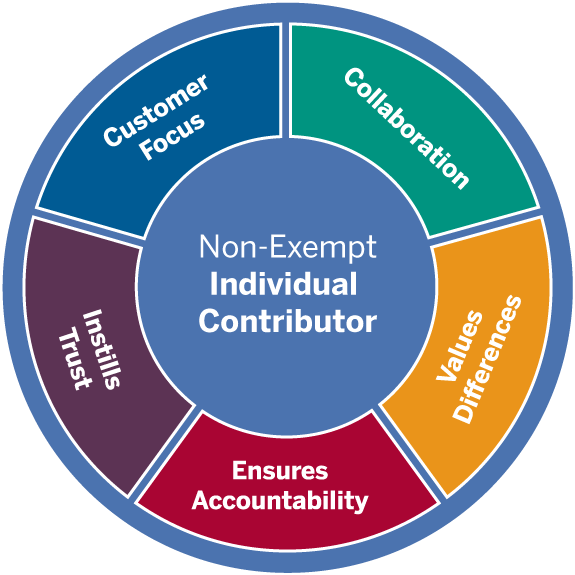Non-Exempt Individual Contributor: Intermediate
Demonstrates Self Awareness
Using a combination of feedback and reflection to gain productive insight into personal strengths and weaknesses
Self-awareness—the ability to clearly assess your own capabilities—gives a foundation upon which to grow, develop, and take on new challenges. Deploying yourself in work and life is greatly helped by really knowing what you are good at, bad at, what you are untested in, and what you overdo and overuse. Self-aware people are able to connect the external perspective—how they see they are perceived by others—with the internal, or how they see themselves. This can be uncomfortable. However, with great risk comes the potential for great reward, both for yourself personally and your organization.
You show this competency when you:
- Reflect on activities and impact on others
- Proactively seek feedback without being defensive
- Are open to criticism and talking about shortcomings
- Admit mistakes and gains insight from experiences
- Know strengths, weaknesses, opportunities, and limits
How to develop this competency:
Seek feedback
People can be reluctant to give feedback, especially negative or corrective information. Generally, to get it, you must ask for it. Seeking negative feedback increases both the accuracy of our understanding and people’s evaluation of our overall effectiveness. If people are reluctant to give criticism, help by making self-appraisal statements rather than asking questions. Saying: “I think I focus too much on operations and miss some of the larger strategic connections. What do you think?” is easier for most people to reply to than a question.
Manage your response
Sometimes feedback doesn’t seem to fit and it’s easy to become defensive or upset. Defensiveness is a major barrier to self-knowledge. Defensive people receive less feedback. To break this cycle, you will need to follow the rules of good listening. Work on keeping yourself in a calm state when receiving negative feedback. Change your thinking. When getting feedback, your only task is to accurately understand what people are trying to tell you. It’s not your task at that point to accept or reject feedback.
Find your hidden strengths
You may have hidden strengths. Others may see strengths that you don’t know you have or don’t think are stand-out skills. If you don’t see them, you won’t draw upon them. Find these strengths through self-reflection. Answer these questions: What comes easily to you? What do you enjoy? When does time fly by? When do you get results? What positive feedback have you received in the past? What themes do you see? What strengths are coming through?
Learn more:
- Video: TED: Increase your awareness with one simple fix
- Book: Emotional Intelligence 2.0 by Travis Bradberry & Jean Greaves
- Book: Insight: The Surprising Truth about How Others See Us, How We See Ourselves, and Why the Answers Matter More than We Think by Tasha Eurich
- Tool: Berkeley Well-Being Institute, self-awareness and well-being quiz
- LinkedIn Learning: Demonstrates Self Awareness course collection

Non-Exempt Individual Contributor
- Core Competencies
- Demonstrates Self Awareness
- Being Resilient
- Self-Development
- Resourcefulness
Foundational
Intermediate
Mastery
